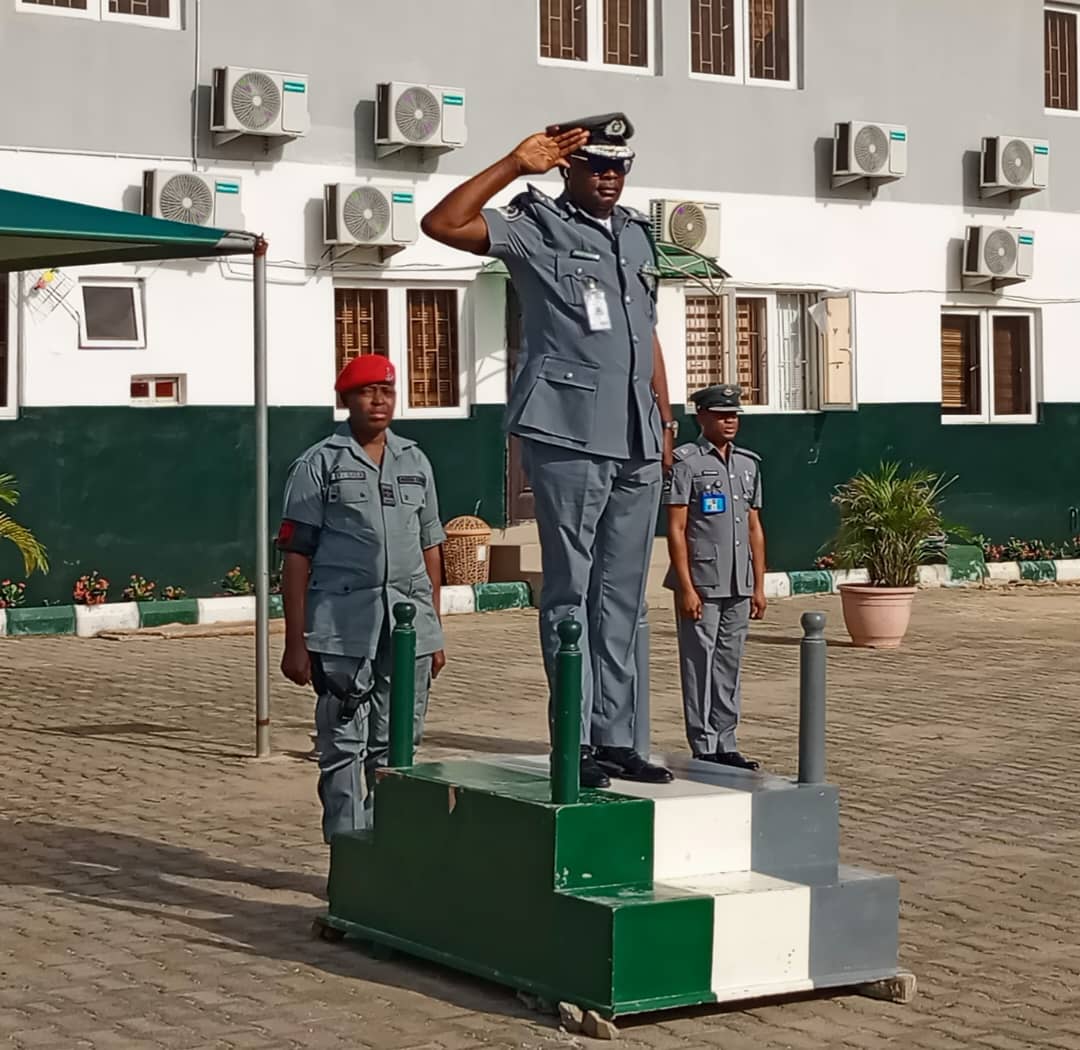Customs Corner
Nigeria advised to do more to crack down as pangolin trade increases

Nigerian advised to do more to crackdown
as pangolin trade increases
- Training of Nigerian officials and exchanges with their customs counterparts in destination countries including China and Vietnam are expected to improve intelligence sharing and curb trafficking.
- Enforcement and prosecution of laws against wildlife trafficking remains weak, say experts, who emphasize the need to treat the matter as a transnational crime rather than as a conservation issue.
- Authorities seized 113 tonnes of pangolin scales originating in Nigeria between 2016 and 2019, more than half of global seizures.
Law enforcement officials around the world have seized more than 200 tonnes of pangolin scales since 2016, more than half of it linked to Nigeria, a new report has found.
The report, published February by the Wildlife Justice Commission (WJC), identified 52 major seizures of pangolin products between 2016 and 2019. More than 130 tonnes were intercepted in 2018 and 2019 alone, indicating an unprecedented increase in trafficking, often engineered by organized criminal networks. In all likelihood, “significant quantities” of pangolin scales continue to be smuggled undetected across borders and oceans.
WJC, which works to tackle organized crime in wildlife trafficking, focused on seizures of 500 kilograms (1,100 pounds) or more, collecting and analyzing media reports, as well as conducting its own investigations to fully assess the extent of the illegal trade in pangolin scales.
The report identifies 27 countries and territories “disproportionately involved” in the trafficking of pangolin scales: just six — Nigeria, Vietnam, China, Singapore, Hong Kong, and the Democratic Republic of Congo (DRC) — accounted for 94% of all intercepted scales.
The analysis points out that the most persistent smuggling routes connect Nigeria to Vietnam and Hong Kong, with Singapore emerging as a transit hub between these countries.
The total weight linked to Nigeria irrespective of role continued to increase throughout the period studied, rising from 10.4 tonnes in 2016 to 13.2 tonnes in 2017, 36.5 tonnes in 2018, and 52.9 tonnes last year. (The United Nations Office on Drugs and Crime last year pointed out that with pangolins in Nigeria seemingly already hunted to the verge of extinction, scales smuggled out of the country to Asia may originate from poaching in neighboring countries.
Pangolin traffickers. Image by USAID via Flickr (CC BY-NC 2.0)
Strengthening enforcement
Nigeria’s Endangered Species (Control of International Trade and Traffic) Act outlaws trade in pangolins. It was amended in 2016 to allow a maximum fine of 5 million naira ($13,000) or one year in prison for offenders.
But with seizures in 2019 easily outstripping 2018’s total, these penalties appear to be insufficient deterrent for either the wealthy syndicates involving Asian merchants and their Nigerian counterparts that drive the trade, or the hunters and bushmeat vendors who supply it, poaching pangolins from as far away as the Democratic Republic of Congo.
Abimbola Animashawun, an intelligence officer with the Nigeria Customs Service (NCS), says it is “worrying … that Nigerian law and penalty for such offenses is still too weak and this is not helping matters at all.”
Very few people have been convicted for wildlife trafficking offenses, despite occasional in-country seizures of large shipments of scales. Thirty-one seizures of illegal wildlife between March 2010 and August 2018 are recorded in a September 2018 submission to CITES, the global wildlife trade authority, from Nigeria’s environment ministry. But only eight of these cases were prosecuted, with three convictions: in each case, the court handed offenders a six-month jail sentence with the option to pay a fine of 100,000 naira ($260).
Enforcement at both ends of the supply chain is also hindered by corruption, according to Sarah Stoner, WJC’s director of intelligence.
Also Read:
“As in any major transnational organised crime, corruption is an enabler of wildlife trafficking, and from previous investigations the WJC has identified that wildlife trafficking is often synonymous with the presence of ‘compliant’ enforcement officials who facilitate the smuggling,” Stoner told Mongabay in an email.
“There is no doubt that transnational trafficking at this scale could not happen without corruption and it continues to be the greatest challenge in addressing wildlife trafficking.”
A raft of new initiatives, including workshops for Nigeria’s enforcement officers and international exchange meetings, has been implemented by conservation groups since 2017 to improve capacity for detection, interception and intelligence sharing.
For instance, the Wildlife Conservation Society (WCS) has organized workshops for Nigerian customs officials to help them search and thoroughly inspect consignments to improve detection rates for illegal wildlife products such as pangolin scales and ivory, thanks to funding from the U.K. Illegal Wildlife Trade Challenge Fund. Customs officials currently prioritize efforts to intercept contraband like rice, imports of which via land border posts have been banned since 2016.
WCS says it hopes the officers who received training will be better able to prevent trafficking of pangolin scales. Additional workshops are planned for Lagos and Port Harcourt this year, said WCS Nigeria director Andrew Dunn.
In September 2019, WCS also facilitated a visit to Nigeria by top Chinese customs officials to share intelligence about Chinese nationals and others identified as part of organized networks involved in the seized pangolin scales originating from Nigeria.
This meeting, Dunn said, will help both countries better coordinate efforts to tackle trafficking of pangolins and other wildlife. There are plans for a similar visit by Vietnamese customs officials in the first half of 2020.
With additional support from the U.S. State Department’s Bureau of International Narcotics and Law Enforcement Affairs, WCS is also working with Nigeria’s National Environmental Standards and Regulations Agency (NESREA) and the NCS to ensure that all seized wildlife products, such as pangolin scales and ivory, are properly catalogued in an online database and stored in secure locations around the country.
One of the WCS staff works directly with the NESREA in the Nigerian capital, Abuja, to keep reliable inventory of all seizures, improve security of the stockpile to ensure that intercepted contraband does not slip back into the market, and make the data readily available for policymakers to improve planning.
White-bellied pangolin. Image by Darren Pietersen/African Pangolin Working Group
Stoner urges stronger international cooperation and demands that trafficking of pangolin scales must be addressed as a transnational crime rather than as a conservation issue. “As in other forms of serious and organized crimes, the application of advanced investigative techniques and intelligence analysis is largely not being applied to wildlife trafficking,” she said.
Stoner points to a recent large-scale seizure of pangolin scales smuggled via Cameroon and the consequent arrest of 20 suspects as a “good example of how high-level and closely coordinated interventions to effectively disrupt the criminal networks driving the global trafficking of scales are crucial.”
Stephen Aina, the Nigerian Conservation Foundation’s coordinator for species recovery and conservation programs, says he wants custom officials to explore the use of whistle-blowers for interceptions and arrests. But he says he also believes a more coordinated approach is required to address the trafficking of pangolin.
“Efforts within the country are at best disjointed and largely uncoordinated,” Aina said.
“There is the need for stakeholders to develop a pangolin conservation blueprint and action plan that will be binding on all actors … a nationally coordinated recommendation is key.”
ADVERTISEMENT

ADVERTISEMENT
Customs Corner
Customs Sensitise Retired Senior Officers on Automated Retiree Verification System

By Muhammad Bashir
The Nigeria Customs Service (NCS) commenced the sensitisation program on Monday, 22 April, 2024, for the enrollment of an automated retiree verification system for high-ranking officers who have retired from the Service.
The programme, the first of its kind, was designed to serve as a platform through which all retired Deputy Comptroller Generals (DCGs), Assistant Comptroller Generals (ACGs), and Comptrollers could be electronically verified to modernise the analogue process of benefits application for retired officers.
Addressing the retirees at the Customs Headquarters in Abuja, the Comptroller-General of Customs, Bashir Adeniyi, represented by Deputy Comptroller-General of Customs (DCG) in-charge of Finance Administration & Technical Service, Festus Okun, described the initiative as timely and assured them of a seamless verification exercise.
He said, “Esteemed retirees, it is with great honour that I address you today on behalf of the Comptroller-General of Customs, Bashir Adewale Adeniyi. This initiative to engage in a seamless verification exercise is timely and proof of the service’s commitment to ensuring your welfare and well-being after years of dedicated service to the Customs Service.”
“We understand the importance of this verification process in ensuring that you receive the benefits and entitlements you rightly deserve. Rest assured, we are dedicated to making this process as smooth and efficient as possible, with the utmost transparency and accountability.
“As Deputy Comptroller-General of Customs overseeing Finance Administration & Technical Service, I assure you that your concerns and needs are our top priority. We value your contributions to the Customs, and we are committed to supporting you in every possible way as you transition into retirement. Thank you for your service, and we look forward to assisting you through this verification process.”
During the verification exercise, some retired officers who voiced their feedback applauded the initiative, stating, “This positive reception emphasises the significance of this endeavour in streamlining access to benefits and entitlements, reaffirming the dedication to serving retirees with the utmost care and diligence.”
Customs Corner
Compt Awe Charges Officers On Performance Towards Increased Revenue Generation

By Femi Anamelechi
Comptroller Michael Awe, in charge of Murtala Muhammed Airport Command, has called on officers and men of the command to rededicate themselves to duty to ensure an increase in revenue generation.
The new Customs Area Controller (CAC), while addressing officers at his inaugural parade at the command on Wednesday, 24 April 2024, called for synergy and cooperation of officers while also warning against any act of sabotage.
He said, “I need your synergy not less than 100% and above. You can do your job diligently with diplomacy, and you will achieve results. Please, and please, try to strategise to ensure your objectives are achieved. Your examination should be 100%. Our pledge is to surpass what we have been generating monthly and daily.”
The CAC also noted the need for all officers to ensure due diligence and maintain discipline in their official duties, as it is the only way to increase revenue generation.
Stating further, Comptroller Awe assured regular appraisal and commendation of officers based on outstanding performance.
“Henceforth, any officer that performs very well, either monthly or quarterly, will be appraised and commended,” he noted.
The Area Controller also urged officers to always dress properly and smartly in the official uniforms approved by the Nigeria Customs Service so as to attract self-respect and dignity.
He assured of a rewarding work relationship with their cooperation.
Customs Corner
Comptroller General of Customs Approves Leadership Shake-Up in Some Strategic Formations

The Nigeria Customs Service (NCS) has announced a significant reorganisation of its leadership, with the Comptroller-General of Customs (CGC) Bashir Adeniyi approving the deployment of new Customs Area Controllers and Comptrollers of Units.
The changes, which aim to strengthen the Service’s operations and enhance its effectiveness, affect several key Commands and Units, including the Federal Operations Unit, Zone A and B, the Western Marine Command, and Area II Command Onne, among others.
As part of the shake-up, Comptroller Hussein Ejibunu has been redeployed to the Nigeria Customs Service Headquarters, while Comptroller Kola Oladeji has taken over as the new head of the Federal Operations Unit (FOU), Zone A.
During a handover and valedictory press conference held at the unit’s headquarters on April 19, 2024, Ejibunu highlighted the successes achieved during his tenure, including improved suppression of smuggling, increased revenue generation, and enhanced stakeholder engagement.
Other formations affected by the wind of change are the Western Marine Command Area II Command Onne, among others.
Similarly, the Nigeria Customs Service, Federal Operations Unit Zone “C” has said that it seized contrabands worth N7,577,259,390.00 between 25 January 2023 and 19 April 2024.
Outgoing Comptroller Kayode Kolade disclosed this in a farewell message while handing over to his successor and new Comptroller of the Unit, Michael Ugbagu.
Kolade thanked the CGC and his entire management team for the trust and confidence bestowed on him to serve as Comptroller, FOU “C” and for replacing him with Ugbagu, known to be a thorough enforcement guru.
Also, Comptroller Baba Imam was not left out as he officially passed the mantle of leadership of Nigeria Customs Service, Area II Command, Onne to Comptroller Mohammed Babandede.
The handover ceremony, held on Friday, 19 April 2024, at the Nigeria Customs Service Area II Command in Onne, was graced by various commanders, heads of security agencies, and stakeholders from the port environment.
Comptroller Baba Imam expressed gratitude to God and commended the CGC for the opportunity to serve. He attributed the Command’s successes, including unprecedented revenue generation, to enhanced synergy, intelligence sharing, and cooperation among security agencies and stakeholders.
The Western Marine Command equally welcomed Comptroller Paul Bamisaiye, who assumed the leadership of the Western Marine Command (WMC) of the Nigeria Customs on 19 April 2024.
Bamisaiye reiterated his commitment to eradicating smuggling along the Western waterways by focusing on seizures, arrests, and prosecution.
The CAC emphasised that the Command is solely an enforcement unit, adding that boats and other operational platforms would be equipped with armaments to enhance their anti-smuggling capabilities.
The Customs Service, Federal Operations Unit, Zone ‘B’, Kaduna, witnessed a change of leadership as Comptroller Wada Chedi handed over to Comptroller Ahmadu Shuaibu.
While delivering his speech, the outgoing Comptroller, Wada appreciated the Comptroller-General of Customs, Bashir Adewale Adeniyi, for the opportunity given to him to serve as the Comptroller of the Unit and also for the new assignments ahead.
He commended the unrelenting support and dedication of the Officers and Men of the Unit while urging them to extend the same support he enjoyed to the new Unit Comptroller, Comptroller Ahmadu Shuaibu.
Additionally, Comptroller Mohammed Yusuf, in charge of the Nigeria Customs Service, Murtala Mohammed Airport Command, handed over the mantle of leadership to the new Customs Area Controller, Comptroller Michael Awe.
In a ceremony held at the command on 17 April 2024, the outgoing Comptroller, Yusuf, expressed gratitude to God and his subordinates for ensuring peace within the Command, adding that “when I came in, the revenue target was N225m daily, shortly after, the target was increased to ₦400m, but we were able to make 90.2% of the revenue target”.
The leadership changes are seen as a strategic move to inject fresh perspectives and ideas into the Service and better position it to tackle emerging challenges and opportunities.
-

 Revenue Streams2 years ago
Revenue Streams2 years agoCommunication Ministry Gives Zero Allocation to Nipost Out of N137.2billion Capital Votes
-

 Customs Corner2 years ago
Customs Corner2 years agoCustoms Emerges Champions of 2022, Male, Female National Volleyball Super Cup
-

 Newsroom3 years ago
Newsroom3 years agoNNPC Blames #EndSARS Protests, As Fuel Queues Return
-

 ICT5 years ago
ICT5 years agoFinally! Huawei Launched Harmony OS | Let the Rivalry Begins with AndrodOS
-

 Naija News6 years ago
Naija News6 years agoINEC registers 23 new political parties. YES, RAP, UP, 20 other parties
-

 COVID-194 years ago
COVID-194 years agoVaccine Trials Starts Round The World: All You Need to Know
-

 Customs Corner3 years ago
Customs Corner3 years agoArea Controller, Murtala Muhammed International Airport Command Passes On
-

 Foreign2 years ago
Foreign2 years agoPhilippines’ Duterte Blocks Bill to Register Social Media Users












